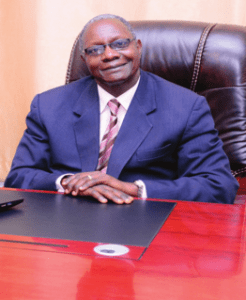
At the epitome of the day to day management of St. Lawrence University (SLAU), the Vice Chancellor Dr. Andrew Ssemwanga has risen through the ranks to the current position he assumed in July last year 2017.
Previously, the humble academician was the Deputy (Academics) in the same University and has been active in providing academic and administrative support.
As St. Lawrence cerebrates its 25th anniversary, Dr. Ssemwanga affirms that this is another milestone in the generation of yet another group of job creators. Dr Ssemwanga cannot hide his pride about staff members who have supported the students over the years to succeed in their respective academic pursuits.
Dr. Ssemwanga is an expert in Institutional Evaluation (Higher Education) and Corporate Governance. In addition, he is a professional Accountant and a Certified Financial Consultant.
In his academic career, he led Cavendish University Uganda in the initial stage of its existence and served in different capacities at Kigali Independent University. He has lectured at both Makerere and Bugema Universities and has been a Research Consultant for the Association of African Universities on continental academic assignments. He has worked as an academic external examiner for several local and external universities.
If given chance to continue serving the University, he is ready to drive the institution into actualizing the dream of attaining a Chartered status. When he became the Vice Chancellor, Dr.
Ssemwanga divided all the activities of the University into six Functional Management Centres, namely, the Offices of the Vice Chancellor, the University Secretary, the Academic Registrar, the Deputy Vice Chancellor (Academics), the Director for Finance and the Human Resource Manager.
“We get regular reports on achievements, challenges and possible solutions from those centres,” he observed. The above Management approach has so far yielded good results and all look forward to better outcomes.
Under his leadership, In line with the University vision, mission, goals and core values, the University will continue to pursuing the following core activities;
-
Provide multi-disciplinary teaching and promote industry-oriented education in Management, Science, Technology, Administration and others through blended learning approaches;
-
Improve the quality of research capacity and deliver practical and credible consulting and advisory services within the university’s areas of specialisation singularly and also in collaboration with other institutions;
-
Attract, develop and retain the highest quality and motivated academic and administrative staff within the core academic and administrative functions of the university;
-
Enhance the University’s competitiveness and sustainability;
-
Enhance the capacity of support functions to facilitate effective and efficient delivery of the University’s services.
